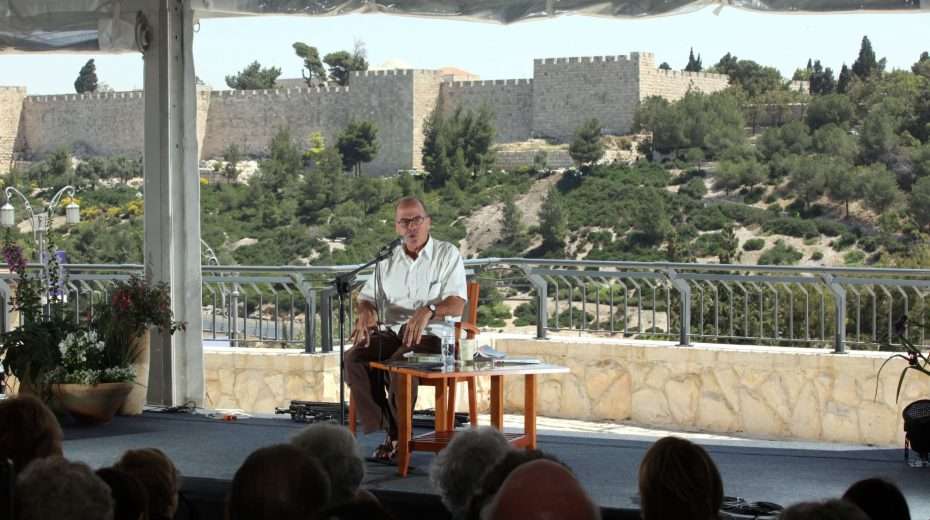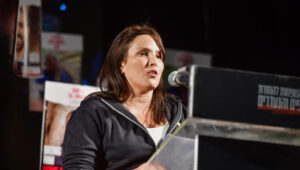Israeli author Meir Shalev was born in 1948 just months after Israeli independence. He grew up into a heritage of words and a heritage of the Land.
He drew from the inspiration of the pioneering agricultural village of Nahalal in the Northern Jezreel Valley where he was born. His mother’s family had arrived there after coming to the Land in the second aliyah from Russia at the very start of the 1900s. And from his father’s family (the writer and poet Yitzhak Shalev), he imbibed the “Jerusalem inspiration.”
The literary works of Meir Shalev are a story of love. Love for the Land of Israel and its tradition; for the people living in it, for its amazing and varied scenery, and above all for its ancient spoken language Hebrew.
He spoke, wrote, and interacted with Hebrew in each of his many hats:
- As a newspaper columnist,
- As a passionate lecturer of the Bible,
- As a botany enthusiast,
- As a beloved children’s author,
- And as a writer of many excellent, unique and wonderful novels.
“I am very happy that Hebrew is my tongue and the language I write in,” he said more than once.
“If right now Jesus and King David were to come in here, I would be able to talk with them and they would be able to talk with me. I would give them a copy of my book. They wouldn’t understand [modern Hebrew] words like tractor, or tomato, but they would understand all [the Hebrew words] concerning love, memory, longing, and revenge. And that’s what life is really about, and that is literature.”
Along with his rich writing for adults, Shalev also appealed with equal success to a younger audience.
He published a series of excellent children’s books with outstanding illustrations (mostly by Yossi Abulafia). According to Shalev, there is a great weight and responsibility in writing children’s books, because the books that children read while growing up, determine their approach to books as adults.
He thought no word was too hard or too high for children. He treated them as he wanted adults to be treated – with humor, compassion, and kindness. He knew that our childish feelings do not disappear, and the stories helped him reveal this beating heart. Children are a very honest audience, and that is what Meir Shalev liked about them.
One of his children’s stories was, “The Tractor in the Sandbox.” The hero of the story, Aaron is already old, and so is his tractor. And what use is there for old men and old tractors? The story brings you to tears, because you don’t need long words to describe old age, heartbreak, or a sense of uselessness. And so every children’s story also becomes a wonderful story for adults.
Shalev wrote nine wonderful novels, including a “Russian novel” describing the days of the Second Aliya, in which Russian Jews such as his mother came to live in the land when it was called Palestine and was still under Turkish-Ottoman rule. He also wrote “A dove and a boy,” “Esau,” and “A few days.”
Each time, the anticipation of reading the next book he would publish, never subsided. His unique style, his love for the Hebrew language, his humor, his sensitivity — all these found expression in each of his books. He spoke straight to the heart of the reader, and it was impossible to escape the emotions that arose upon reading each and every novel.
Meir’s father was once runner up in the Israeli Bible knowledge contest, and instilled in Meir a deep connection with the stories of the Hebrew scriptures. Shalev also drew from additional Jewish and rabbinic sources, illuminating his stories in an original light.
“Unlike the New Testament, the Hebrew scriptures are an open book,” he used to say.
There is love, passion, betrayal, and family intrigue in the Hebrew scriptures. These contribute to our fascination with the Tanach and its tremendous impact on Jewish identity.
His books “Tanach Now” and “Bereshit” testify to his wealth of knowledge and his originality of interpretation.
Meir lived in the Western Galilean village of Alonei Abba. He was very strict about his daily routine, patterning it after his farmer uncles, who had worked the land in nearby Nahalal:
- At 4 in the morning they would get up to milk cows. And Meir woke up at that hour “to milk words”.
- At 9 they would have a breakfast of chopped fresh vegetables, white cheese and an egg. Meir did likewise, only with the addition of hot chili-peppers and garlic.
- At 12 they would take a break, with a light lunch and a short nap. Meir Shalev did the same.
- And in the afternoon Meir would get up to edit and polish his writing.
He always had a “soft spot” for craftsmen. He would look at his uncle harvesting grain with a scythe and he would look like an angel of God to him. He also felt the same way about his own craft, the craft of writing. “It is enough for me to move one word in the sentence,” he said “and suddenly there will be light.”
In between his book writing, he also wrote about current affairs – with years’ worth of columns in the daily newspaper Yediot Ahronoth which he began writing in 1968 after the Six Day War, where he participated in battles as a combat soldier in the Golani Brigade’s recon unit.
In the war he lost friends and was himself wounded by friendly fire.
Although he grew up and was educated in a home with a very right-wing father, after the war Meir’s political views swung in a different direction. And as he put it, he did not allow himself to be carried away by the feverish intoxication of victory.
He says that once when on leave from the army after the war, he came home and got into a bitter argument with his father – who was very proud of his son who participated in the war.
Meir told his father that the territories Israel had just conquered, should be returned not out of ideology but out of practical logic. For him, it was simply a matter of too many people living in a small area. But the sentence Meir said, that drove his father crazy, was, “We have taken a bite that will choke us.” However, Shalev was careful not to meddle with politics in his literary works.
Meir Shalev died on the seventh day of the Passover Feast of Unleavened Bread. According to Jewish tradition this is the anniversary of the Parting of the Red Sea.
He was only 74 years old, but left us an extensive and diverse literary legacy. I wish he had left us even more. May his memory be blessed.















